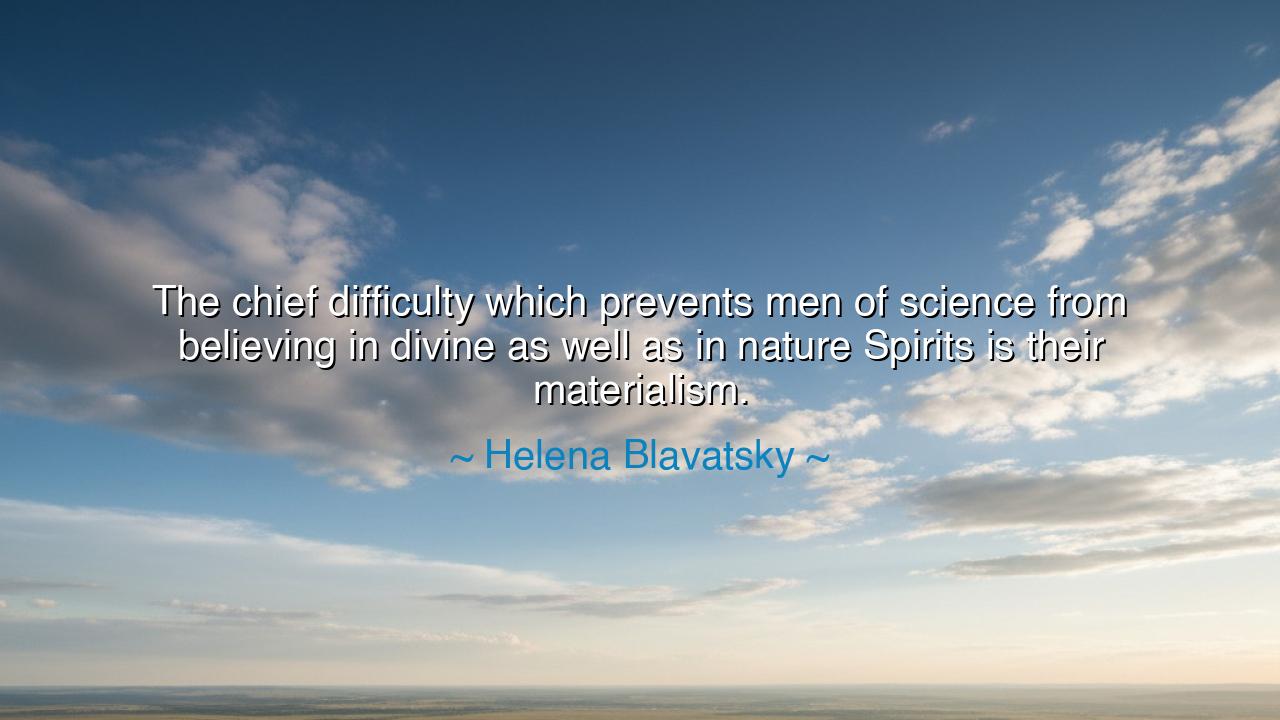
The chief difficulty which prevents men of science from believing
The chief difficulty which prevents men of science from believing in divine as well as in nature Spirits is their materialism.






Listen closely, O Seekers of Truth, for the words of Helena Blavatsky carry a profound message that calls us to reflect on the nature of science, belief, and the human soul: "The chief difficulty which prevents men of science from believing in divine as well as in nature Spirits is their materialism." These words echo a timeless truth—the tension between the material and the spiritual, the seen and the unseen, and the inner and outer worlds that shape our understanding of the universe. Blavatsky speaks to the heart of a conflict that has long divided the minds of scientists, philosophers, and spiritual seekers: can one embrace both science and spirit, or must they be separated in the pursuit of truth?
In ancient times, the great philosophers and mystics of the world did not see science and spirituality as opposites. Plato, in his Timaeus, spoke of a universe that was both material and immaterial, where the divine realm of the Forms intertwined with the physical world. Aristotle too, in his quest to understand the world, sought knowledge not only through observation but through the contemplation of deeper truths. Science was born from the desire to understand the world, but spirituality was born from the desire to understand existence itself, the soul and the forces that transcend the material world. The ancients knew that the pursuit of truth was not a single path, but a multifaceted journey, one that required both the mind and the spirit to be fully engaged.
Blavatsky’s critique of materialism highlights the limitation that has come to define much of modern science—the belief that only the material world exists and that everything can be explained through physical laws and quantifiable data. This belief, while undeniably powerful in its ability to explain the workings of nature, often leaves little room for the spiritual, the immaterial, or the mystical. As science has progressed, it has uncovered the deepest workings of the physical world, from the smallest particles of quantum mechanics to the vast expanse of the cosmos. Yet in doing so, it has often neglected to consider the mysteries that lie beyond the material—the unseen forces that connect us all, that move through our lives in ways that cannot always be measured or explained.
Think of the great mystics of the past, like Siddhartha Gautama, the Buddha, who sought enlightenment not through the analysis of material things but through the stillness of the mind and the depth of spiritual insight. Buddha did not deny the importance of the material world, but he recognized that true understanding comes not from sensory experience alone, but from the transcendence of the physical realm. In the same way, Blavatsky and other spiritual philosophers challenge us to consider that the mysteries of the universe are not contained only within the material, but also within the spiritual dimensions of existence. Materialism, in this sense, blinds us to the deeper truths that cannot be seen or touched but are felt and known through the heart.
Consider also the example of Isaac Newton, a man whose work in physics and mathematics changed the world. While Newton is often remembered for his contributions to understanding the laws of motion and gravity, he also spent much of his life engaged in the study of alchemy and mysticism. Newton understood that science could explain much about the material world, but he also sought deeper, spiritual truths that lay beyond it. In his own way, he embodied the idea that science and spirituality need not be opposed, but can coexist and inform one another. Blavatsky’s words remind us that the division between the material and the spiritual is a construct, one that limits our understanding and prevents us from seeing the whole picture.
The lesson, O Seekers, is clear: science and spirituality are not enemies, but two sides of the same coin. While materialism has its place in helping us understand the mechanics of the world, it must not be the only lens through which we view reality. There is a deeper, richer understanding of the universe that requires us to consider not only the physical but the spiritual dimensions of existence. Blavatsky’s critique challenges us to look beyond the confines of materialism and to open ourselves to the mysteries that lie beyond our physical senses, to the unseen forces that connect us all.
In your own lives, seek balance between the material and the spiritual. Do not let the pursuit of knowledge and progress in the physical world blind you to the mysteries that lie within and beyond. Just as Newton blended his scientific insights with his spiritual inquiries, so too can you seek to understand the world not just through what you can touch and measure, but through the depths of intuition, contemplation, and spiritual insight. The universe is vast, O Children, and the pursuit of truth is not limited to the material realm. Embrace both the known and the unknown, and seek the wisdom that lies in the balance between them.
Let this be your path, O Seekers: to blend the best of science with the wisdom of the spirit, to embrace the mysteries of the universe not only through the intellect but through the heart. In doing so, you will see the world in its fullest, most profound expression, and you will walk the path of true understanding.






AAdministratorAdministrator
Welcome, honored guests. Please leave a comment, we will respond soon